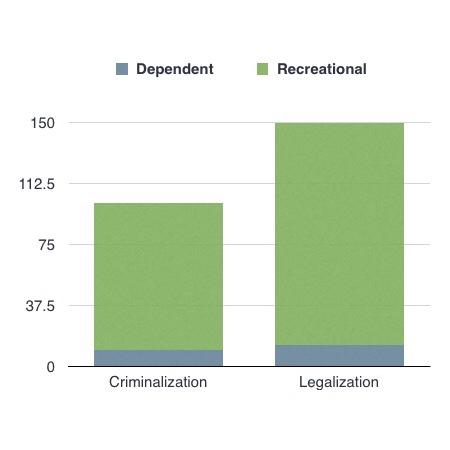“Marijuana Legalization: What Everyone Needs to Know” by Jonathan P. Caulkins, Angela Hawken, Beau Kilmer, and Mark A.R. Kleiman
This is part one of my review. I hope to address some additional specific areas in future posts.
First of all, let me start by saying that this is probably the best writing about marijuana legalization that has ever been done, that wasn't written by an outright legalization advocate.
This may be a surprise to regular readers of Drug WarRant, who know that I often take (even vehement) exception to many positions held by the so-called “academics” of U.S. drug policy writing.
But it really is good, for the most part. It's garnered some rave reviews, including this one from Philip Smith at StopTheDrugWar.org.
In a world where the official state position is Reefer Madness, a book like this is a breath of fresh air, in that it really does take a look at the facts of the subject in a balanced way. Even in little ways, that's refreshing. In a section about the uncertainties of the respiratory effects of marijuana smoke, for example, the authors take the time to remind the reader that smoking isn't the only delivery method. Can you imagine that even being mentioned by Drug Czar Kerlikowske?
The incredible strength of balance is also ultimately its weakness, in a way–particularly when it comes to analysis. Balanced is generally good, but trying to present balanced arguments about the relative positions regarding whether the earth is flat or round would be completely absurd in today's world. And to those of us fully informed about marijuana prohibition and its effects, some “balanced” arguments about legalization can seem just as awkward.
But first, let's take a look at some more good stuff. Check out this passage from Chapter 8 of the book:
Why even consider legalizing a substance whose use creates harm?
The liberty to make our own decisions about our own lives–including decisions that seem unwise to other people–is valuable, and allows us to learn from our own mistakes and those of others. Intoxicating drugs are hardly the only potentially dangerous consumer items of recreational activities. People get killed and crippled climbing mountains, jumping out of airplanes, sailing, scuba diving, playing football, and riding motorcycles. Marijuana use may well be less risky than any of those other forms of recreation, yet a proposal to ban any of them would generate outrage.
It isn't obvious that the majority of the users who do not, and would not, abuse the drug deserve to be inconvenienced–to say the least–to protect against the consequences of less responsible users.
Moreover, drug laws create risks and harms of their own–most of all, the harms associated with illicit markets.
Wow. That's some good stuff.
Be honest, now. How many of you regular readers expected such a passage to be in this book?
There's lots in the book like this, and tons of good, clear information. The section of marijuana and driving, for example, would be despised by the Drug Czar. There's even some enjoyable reading in the non-medical uses of marijuana, dealing with creativity and… the (gasp!) valuable pleasures of using it.
On the other hand, you can start to tell the influence of different members of the authorial team as you start delving further. In contrast to the clear statement of liberty above, just a little further in chapter 8, there is an excruciatingly long and torturous dance around John Stuart Mills' “Harm Principle,” that desperately argues for paternalism in drug policy for such bizarre purposes as addressing the “fashion” of drug taking. It seems clear that those two passages were written by different authors.
[Update: I was wrong. Mark Kleiman says: “But, as it happens, both of the passages in question originated on my keyboard.”]
There are also a few strange things in this book. For example, in the section entitled “Does Marijuana cause cancer?,” the authors note that there is nowhere near the level of proof needed to determine that marijuana causes cancer (I know… a strange way of wording it). And several studies are specifically mentioned–some that seem to disprove any cancer connection along with a couple that showed small risk–with the indication that “published research shows mixed results.” Yet, the major 2006 study by Donald Tashkin of UCLA, funded by NIDA, that conclusively determined that marijuana does not cause lung cancer, is oddly not mentioned.
There are also some passages that are really just plain bad. This one, at the conclusion of Chapter 11, for example:
In the end, all this fancy benefit-cost analysis boils down to a rather simple proposition […] If you think marijuana intoxication is, on average, a good thing–counting both the happy controlled users and the unhappy dependent users–then a benefit-cost analysis done in a way that reflects your values will probably conclude that legalization improves social welfare. If you think marijuana intoxication is, on average, a bad thing, then an analysis that reflects your values will probably conclude that legalization harms social welfare–because the dominant outcome of legalization will be more marijuana use.
That's outrageous, and, quite frankly, offensive. This is what passes for academic writing? The passage completely ignores the huge portion of the debate represented by folks like Law Enforcement Against Prohibition–people who do not take a viewpoint regarding the value of marijuana “intoxication,” but rather do an actual cost-benefit analysis that takes into account the real problems presented by the war on marijuana users. People who care about the outcomes of 800,000 arrestees (and what that means to their jobs, their education, their families, their income), even if they don't do marijuana themselves. People who want to at least reduce the black market in drugs. People who care more about liberty than paternalism and don't think it's right for government to harm someone who is doing no harm in a misguided attempt to prevent someone else from voluntarily harming themselves. It's a stupid effort that seems to try to turn the entire debate into one pitting marijuana enthusiasts against marijuana foes as opposed to actually talking about policy.
This particular mess appears clearly to be the work of Jon Caulkins, who writes (in the section where each author gives his own views): “If you like marijuana intoxication, you should like marijuana legalization; if you don't, you shouldn't.” A rather heavy paternalist, he also says that “the majority who would use responsibly ought to be willing to give up their fun to protect the minority who would not.” Nowhere, however, does he prove that criminalization has done anything of the kind.
These lapses take away from the overall good work done in the book, by having the authors' personal biases govern the analyses, instead of having the facts inform them.
More to come in a future post…



